David Millar: 'I took powerful, dangerous drug thanks to TUE loophole'
Former British pro David Millar recounts what taking triamcinolone (Kenacort) did to his body and mind, and says he took it due to a TUE for a 'fake tendon issue'
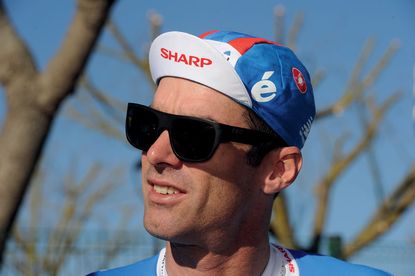

David Millar has revealed that he received injections of controversial drug Kenacort (triamcinolone) during his professional riding career due to a therapeutic use exemption (TUE) certificate for what he describes as a 'fake tendon issue'.
In an article entitled 'How to Get Away with Doping' written by Millar for the New York Times on Sunday, he recounts the effects that the powerful drug had on his body and mind.
The drug is the same one that Bradley Wiggins received to treat allergies, which came to light when hacking group Fancy Bears published Wiggins's TUEs online. TUEs are issued when an athlete is prescribed a substance on the World Anti-Doping Agency's prohibited list for a legitimate medical reason. A TUE is not in itself a sign of wrongdoing.
Millar writes about his first experiences in the pro ranks from 1997, where he says that he rode clean initially but turned to doping in order to achieve more results. He says that he was taking EPO by the 2001 season. He later used Kenacort three times, the first for a legitimate medical reason after suffering from allergies.
>>> David Millar calls for Bradley Wiggins’s TUE medication to be banned
"On one occasion, I received a TUE for a fake tendon issue," said Millar. "A doctor simply wrote a prescription for an ankle injury that required an intra-articular injection [of Kenacort], although the injection was then administered intramuscularly."
Millar continued: "The Kenacort was so powerful that it was ultimately destructive: Apart from being a catabolic agent, it would also suppress your immune system, making you more susceptible to infections.
Get The Leadout Newsletter
The latest race content, interviews, features, reviews and expert buying guides, direct to your inbox!
"I didn’t like taking it, but I was so deep into what I was doing at the time that I did what I considered had to be done."
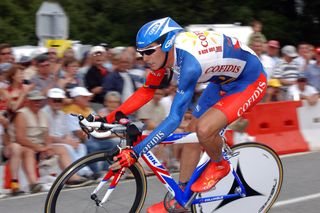
Millar says he took the drug ahead of the Vuelta a España in 2002 and Tour de France in 2003. He writes that it enabled him to lose weight without losing power, and he felt stronger.
"Kenacort was a once-a-year drug; the stress it put on your body required time to recover. You’d be mad to take it more often or in bigger doses, although, sadly, there were enough madmen around at the time in pro cycling who surely did just that.
"The three times I took Kenacort were also the times I was the lightest I’d been in my career, yet I didn’t lose power — often the penalty when a rider sheds weight. Physically, I looked like a machine, muscle fibres were visible and a road map of veins crisscrossed my entire body."
Millar says that the drug 'altered his mental state' and exaggerated his moods and decreased his ability to sleep. Nevertheless, Millar was taking the drug within in the rules.
"I was taking this powerful, potentially dangerous drug as a performance enhancer, yet I was doing so within the rules — thanks to the TUE loophole. My doping, for that is what it was, could not be judged illegal as long as I fulfilled all the criteria demanded by the authorities. I was within the letter of the law, even though I was cheating it. I was in the grey zone."
>>> Bradley Wiggins missed whereabouts test in May, report suggests
After a police raid on his accommodation in Biarritz yielded EPO syringes, Millar admitted to doping and was banned for two years in 2004. When he returned to racing, Millar became a staunch anti-doping advocate and has frequently been outspoken about doping in the peloton. He says that the TUE system needs an overhaul to prevent abuse, and to secure riders' health.
"A TUE should allow access to a performance-enhancing drug only if that drug is required for proven medical reasons. Then a TUE should permit its use — but only out of competition. If any traces of the drug are found by in-competition testing, then that should result in a ban.
"For an athlete’s own well-being, it is better to face the fact of sickness or injury and withdraw from competition. And for the sport’s well-being, it is better to avoid a system open to abuse and exploitation."

Thank you for reading 20 articles this month* Join now for unlimited access
Enjoy your first month for just £1 / $1 / €1
*Read 5 free articles per month without a subscription

Join now for unlimited access
Try first month for just £1 / $1 / €1

Nigel Wynn worked as associate editor on CyclingWeekly.com, he worked almost single-handedly on the Cycling Weekly website in its early days. His passion for cycling, his writing and his creativity, as well as his hard work and dedication, were the original driving force behind the website’s success. Without him, CyclingWeekly.com would certainly not exist on the size and scale that it enjoys today. Nigel sadly passed away, following a brave battle with a cancer-related illness, in 2018. He was a highly valued colleague, and more importantly, an exceptional person to work with - his presence is sorely missed.
-
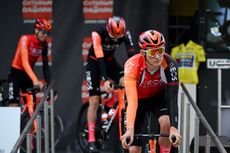 'With a few changes, it'll be class' - Josh Tarling optimistic about Ineos Grenadiers future
'With a few changes, it'll be class' - Josh Tarling optimistic about Ineos Grenadiers future'Everybody wants to get better and get back to winning,' 20-year-old tells audience at Rouleur Live
By Tom Davidson Published
-
 'Knowing the course in a virtual race is maybe even more important than in road racing': Former e-sports World Champion's top tips
'Knowing the course in a virtual race is maybe even more important than in road racing': Former e-sports World Champion's top tipsSpeed skater turned eSports world champion, Loes Adegeest, on how to become virtually unbeatable when racing indoors
By Chris Marshall-Bell Published
-
 'It's going to damage cycling in the UK' - Ned Boulting, David Millar and Pete Kennaugh react to ITV losing Tour de France rights
'It's going to damage cycling in the UK' - Ned Boulting, David Millar and Pete Kennaugh react to ITV losing Tour de France rightsChannel's commentary team warn of 'devastating effect' of not having free-to-air race coverage
By Tom Davidson Published
-
 David Millar and Garmin reunite as CHPT3 clothing brand relaunches
David Millar and Garmin reunite as CHPT3 clothing brand relaunchesBritish Former pro Millar is rebooting his cycling kit brand with a new focus and new investor
By Alex Ballinger Published
-
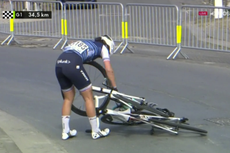 The nine best bike throws in the history of cycling
The nine best bike throws in the history of cyclingCycling Weekly looks back at some of the most memorable bike throws of all time, from Bradley Wiggins's stylish Trentino effort to Dumoulin's hissy fit.
By Alex Ballinger Published
-
 'There's still a lot of work to do': David Millar vows to continue fight for change after losing CPA election
'There's still a lot of work to do': David Millar vows to continue fight for change after losing CPA electionDavid Millar says the fight give professional cyclists a voice starts now after he lost the election for CPA president.
By Gregor Brown Published
-
 'I didn't think it would kick off this much' - David Millar on fighting for riders' rights in CPA election
'I didn't think it would kick off this much' - David Millar on fighting for riders' rights in CPA electionGiving riders a meaningful voice is the next big issue facing professional cycling after the era of systematic doping, according to former racer David Millar.
By Alex Ballinger Published
-
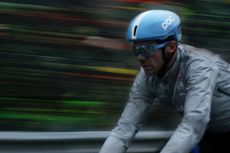 David Millar's Time Trial review: 'A captivating insight into pro racing'
David Millar's Time Trial review: 'A captivating insight into pro racing'Charles Graham-Dixon reviews David Millar's film, 'Time Trial'
By Richard Windsor Published
-
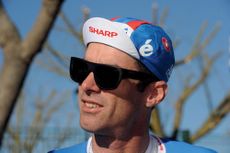 David Millar defends his role as a British Cycling Academy mentor
David Millar defends his role as a British Cycling Academy mentorFormer Garmin-Sharp rider David Millar says he is in a good position to mentor young British riders about the dangers of doping
By Stuart Clarke Published
-
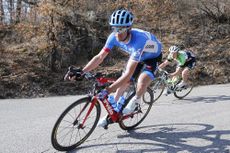 David Millar mentoring British Cycling academy riders about anti-doping
David Millar mentoring British Cycling academy riders about anti-dopingMultiple Grand Tour stage winner David Millar has been mentoring British Cycling academy riders on anti-doping at their new base in northern Italy
By Cycling Weekly Published